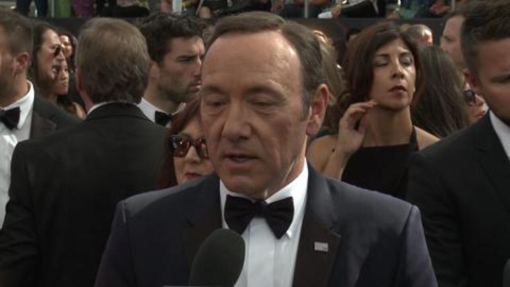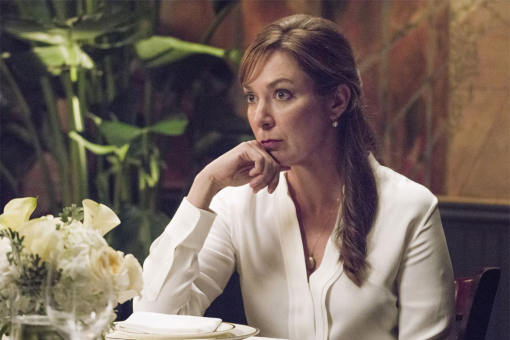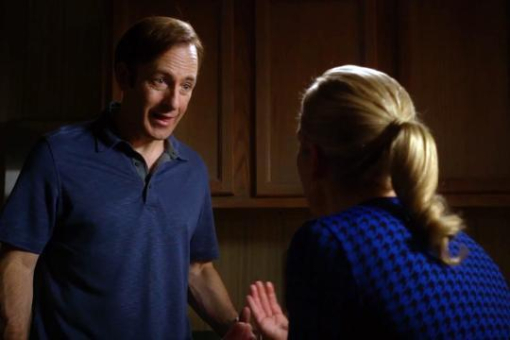Over the first two seasons of House of Cards, South Carolina Congressman Francis Underwood (Kevin Spacey) backstabbed his way into the Oval Office after being passed over for secretary of state.
Now that he's achieved his goal, will the story be about maintaining the presidency amid threats? And is that inherently less dramatic than his quest to attain the ultimate seat of power?
"Those are great questions," says Beau Willimon. "They're exactly the sorts of questions I want people to be asking. But I'm not going to answer any of them."
How about answering general questions? "There's no such thing as a general question," he demurs. "I applaud your sneakiness, but it's not going to work."
That's no empty ovation. As the brains behind Cards, Willimon has proved himself to be the Shakespeare of sneakiness.
But as Netflix's political saga prepares to unleash its third season on February 27, you'd be forgiven for mistaking Willimon, 37, for any other Brooklyn hipster sipping coffee at his local Starbucks. With his spiky coif and goatee, he blends in easily with the caffeinated neighbors on a brisk Sunday morning.
When Spacey first met Willimon, "I wondered how this 12-year-old got into the room," the actor recalls with a chuckle. "But all you have to do is spend about 20 minutes talking with Beau to realize that he's a guy with a fertile mind and an incredible imagination, with real clarity and a real vision."
Spacey's leading lady, Robin Wright, shares a similar memory of meeting Willimon. "I remember we had coffee, and he basically executed a verbal novel," she marvels. "A novel of characters, the arcs of the characters — this ruthless power couple and how they ignite each other. He was able to portray such a beautiful story about corruption."
Willimon also displays his ability to spin a tale as he recounts his circuitous route to becoming Cards' creative driving force.
The son of a navy captain, he was born in the shadow of the U.S. Capitol in Alexandria, Virginia, then lived in Hawaii, San Francisco and Philadelphia before his father retired and the family settled in St. Louis — all by the time he was 10.
Frequent relocation prepared him for a career in entertainment.
"Film, theater and TV is a bit of a gypsy life," he says. "You jump from project to project and from collaborative family to collaborative family. It does dispose you toward a curious mind, because you're constantly being confronted with new environments, new people, a whole different set of rules."
At St. Louis's John Burroughs School — where alum Jon Hamm returned as a drama teacher when Willimon was a senior in 1995 — he got his first exposure to the stage.
"I can't say I was a particularly good actor, but I had a lot of enthusiasm," he remembers. "My main talents had to do with the visual arts. I was doing a lot of painting, drawing and sculpting, and I thought that was the direction I would go in."
Yet Willimon continued on a peripatetic path. While studying physics and visual arts at Columbia University, he used any excuse to travel, even working as an intern for the Estonian government one summer.
On a whim, he entered a campus playwriting contest and won $1,500 ("It was a terrible play — I may have taken down the only flyer they put up.")
As a Columbia grad student in theater, he moved to Vietnam for four months to research a play about one of his professors and ended up spending a year on a fellowship in South Africa doing 40 lithographs.
"I just wanted to have adventures," he admits. "I didn't have enough money to pay for them myself, but I was pretty good at convincing other people to give me just enough to go and have experiences."
Willimon's Cards cohorts believe these far-flung exploits helped expand his dazzlingly broad frame of reference as a writer.
"Beau brings so many things to the table," Spacey says. Adds Wright, "He's an impressive, prolific man. He's lived a multifaceted life. He's almost a carny."
He learned a few more skills while pursuing yet another passion: politics. Recruited by his college pal Jay Carson — now House of Cards' political adviser — Willimon joined Charles Schumer's 1998 New York Senate campaign.
"It was an amazing experience," he says. "A lot of adrenaline, a lot of fun, great people — and we won."
Next, he moved to Iowa to work on Howard Dean's 2000 presidential effort.
"It's a form of voluntary insanity," he says of life on the campaign trail, "You're working for little or no money, 100 hours a week, in an unfamiliar place. But it has that sort of excitement that comes with being on the move."
Still, he insists he never planned to go into politics; he just viewed it as an avenue for more adventures.
"I believed in the candidates I worked for, but I didn't see them as stepping-stones for a career in politics — that wasn't in the cards," he says, no pun intended. "Nor did I see these as opportunities to soak up a bunch of political expertise so I could write about it. That thought never crossed my mind."
At least not until he returned to New York City after Dean's primary loss and "followed the old adage of 'write what you know,'" he says. "I had worked on enough campaigns to know that I wasn't entirely ignorant on the subject."
The result was a play, Farragut North, about a young campaign manager at a moral crossroads. He sent it out unsolicited to 40 theaters around the country and received 40 rejection letters, yet it somehow ended up in a few very important in-boxes,
"Warner Bros., George Clooney and Leonardo DiCaprio have all said to me they each had it first," Willimon says.
"I don't know how they got it. With assistants out in L.A., things move rapidly around the hyperweb, and I got that Cinderella call one day that they wanted to option the play."
Despite the fact that the show had never been produced, Willimon began to turn it into a screenplay for DiCaprio's Warner Bros.-based Appian Way production company. Clooney planned to produce, direct and star as the candidate, with Ryan Gosling cast as his manager.
After working on the first two drafts, Willimon turned it over to the filmmaker and his producing partner, Grant Heslov.
"I felt like the best thing to do was to step back and let this be Clooney's jam," Willimon says of the script, which was retitled The Ides of March and nominated for an Oscar in 2012.
"The story and characters were in very capable hands, and he made a great movie."
Almost overnight, everyone in Hollywood wanted to be in the Beau Willimon business.
He was offered every political project in town, including adapting the 1990 British miniseries House of Cards, the rights to which had floated around for years but landed with acclaimed director David Fincher (The Social Network, Gone Girl).
"The idea of writing about politics again and for television was not so attractive to me at the time," Willimon confesses. "But I thought, at the very least, I'll get to have a conversation with Fincher, and that'll be worth it."
He started watching the BBC original, and "within about 15 minutes, I had an 'Oh, f—k!' moment," Willimon says. "I had a lot of ideas on what I would do with it, and I started to get excited about it. I thought, if this conversation with Fincher goes well, I'm not going to have much of a choice here. And it did go well."
One of the first things he said to Fincher was, "I don't want to feel bound in any way to the BBC version. There's plenty I want to steal, but we're 20-plus years on, this is an American setting, and we need to expand and deepen everything to do an open-ended TV series because the entire mini-series was only 12 hours."
Perhaps the biggest change he made was to Francis's relationship with his wife, a relatively minor character in the original.
"I wanted to make Claire an equal partner and someone we spend as much time with as we do with Francis," Willimon says. That balance appealed to Wright. "They are absolute allies," she notes of Claire and Frank. "She's both sexes, in a sense. It's not just male-female dynamics."
Among the aspects Willimon did preserve from the British version: Francis's direct-address speeches to the camera.
"It's so delicious," he explains. "It makes you complicit in his deeds, and that helps you root for him, despite yourself. That's an interesting tension to have between the character and the audience."
Willimon insists that binge-watching - Netflix rolls out each season in its entirety - doesn't influence his writing.
"If you think about all the great shows that have preceded this moment in time - whether it's The Sopranos, Breaking Bad, The Wire or Mad Men - they were all released week to week, yet many people, myself included, experienced them in a binge fashion," he says.
"They worked that way, but they weren't written for that. The reason they worked is because they're really f—ing good stories."
Frank's rise to the proverbial throne has been just as gripping, and now, like his lead character, Willimon has centralized power behind the scenes on Cards.
"We had more producers on-set in the beginning," Wright says. "Now he's the prevailing producer. He's not only the writer — he understands the origin and conclusion of every story beat. He's all things and all the departments, which is so helpful."
Yet Willimon is not one to take all the credit. "As a direct result of working with all of these very talented and experienced people, I felt increasingly more confident about being 'the guy,'" he says.
"I'm pretty obsessive, and I settle for nothing less than perfection, which is unattainable, so that's a form of craziness."
Although Willimon isn't obsessive enough to insist that his actors stick to every syllable of the scripts, Spacey says, "I don't believe in improvisation with something this well-written. My requests for changes often have to do with the rhythms of the Southern accent, and Beau is not precious, which is a huge asset."
Another major benefit is Willimon's seemingly inexhaustible stamina during the brutal hours on Cards' Maryland set.
"He's got a fortitude, will and drive that very few builders do," Wright enthuses. "He stays up late every night to write and gets up early every morning. He drives home to Brooklyn every Friday night and comes back to Baltimore every Sunday. He's an animal."
Agrees Spacey: "When you love what you do and you're surrounded by people you're challenged by, you step up, and Beau definitely has. I don't know how he does it."
He's been encouraged by the love the Primetime Emmys have given Cards, which earned 22 nominations and won four awards in its first two seasons.
"When we first started, we had no notion as to whether we would even be eligible, because what category did streaming television fall into?" he says. "So to get reinforcement from people who know what it means to make good TV is icing on top of the icing. It feels really good. And it only motivates you to want to do even better the next year."
Not that he'll give away anything about next year. After all, a master of Cards tricks never reveals his secrets.














